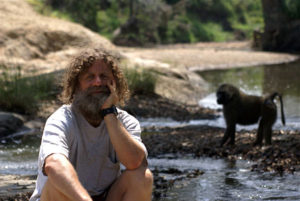My takeaways from the novel:
What I learned:
Despite occasional confusion of how different tribes related, which warden or guard was corrupt, and how the hell Robert ended up in a lorry with Pius – the Coca Cola devil, the novel was a treat and truly taught me so much about the barriers researchers and advocates for animals experience. Robert shows the difficulty of navigating the bureaucracy of Kenya and the social restrictions impeding justice.
It shocked me when Robert said Tampai and the meat inspector were knowingly administering cow meat infected with TB to tourists, but I was way more shocked when Robert said that informing those tourists would be futile. He says, “When Timpai poisoned everyone by slaughtering the dead cow, there was irritation, but little more than that.” Sapolsky would ask people how they felt, and they replied, “Well, Timpai and that inspector have learned… they must be paying the police a lot of money, so maybe they will not do it again.” Sapolsky, in utter frustration, exclaims it could have killed them and their kids.
“They would say the archetypal resigned Swahili word, ‘dunia.’ ‘That’s the world, that’s how it is.'”
This was my primary aha moment from the novel. People living in a corrupt society where the people are constantly taken advantage of by any persons of authority in addition to merchants and businesses accept their lack of control. In America, although we are far from achieving justice in a myriad of contexts, we constantly fight for justice – we even feel entitled to it – and feel enraged at corruption. It goes to show our privilege as people who take surplus of food, commerce, material goods, and of course, our government for granted. In fact, many of us complain about all of these things listed, but I believe we can definitely learn peace in acceptance, and when it’s worth it to fight for justice.
Despite his fantasies of headlines outlining the lodge’s corruption, Sapolsky never attained the sweet revenge he hoped. I learned that people honestly don’t care about baboons, a species that is not endangered, and publications of the outbreak would only be shared in the scientific community, whose plethora of articles rarely become public knowledge or concern.
Lingering Questions:
My biggest question is was the lodge Rob was scammed to permit the manager to shoot the baboons in anyway connected to the other TB outbreak? I do wonder why Sapolsky never sought revenge for his baboons. I wonder what Timpai and the meat inspector are up to, and if they ever stopped selling bad meat. I wonder how humane it is to study baboons and other primates in a laboratory setting given their intense emotions and intellectual ability. I wonder what they think and feel in those situations, and I wonder if they feel fear when members of their troop are ill. I wonder how hierarchy and stress levels differ, if at all, in female baboons, and if testosterone should be tested instead of cortisol. I wonder what Sapolsky’s work at Stanford means to him in comparison to his field work.

 Sapolsky’s honesty is brutal, but refreshing. Despite all the times he was scammed, sustaining himself with canned spaghetti and camel’s milk, attacked by army ants, and fighting with wardens, Sapolsky remains upbeat and humorous. You cannot help but feel his frustrations, joys, and fears as you read. Furthermore, Sapolsky makes you want more at the end of the novel. You want to know how the troop evolves after the outbreak of TB, but instead are left with only a list of who perished.
Sapolsky’s honesty is brutal, but refreshing. Despite all the times he was scammed, sustaining himself with canned spaghetti and camel’s milk, attacked by army ants, and fighting with wardens, Sapolsky remains upbeat and humorous. You cannot help but feel his frustrations, joys, and fears as you read. Furthermore, Sapolsky makes you want more at the end of the novel. You want to know how the troop evolves after the outbreak of TB, but instead are left with only a list of who perished.